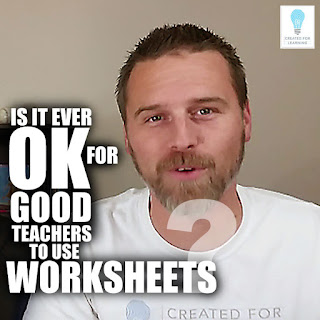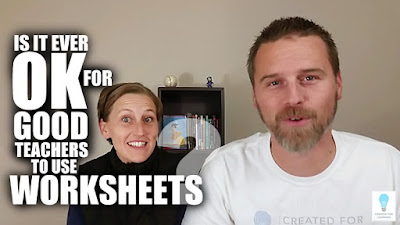Today, we’re gonna talk about the wonderful world of worksheets and why some teachers think they’re the devil. Oh, the warmth of fresh copied papers … And the glorious smell of the ditto papers…
Watch the YouTube video here >>> https://youtu.be/3yRpU1uqPwY
Oh, if I had a papercut for every time I heard someone talk down about “worksheet teachers…” We probably all know the concept of the “worksheet and video teacher.” You know, that teacher we imagine never engages his classroom and sits behind his desk organizing his fantasy football team or shopping for her new season wardrobe.
There’s something about this term “worksheet” that carries a negative connotation nowadays. We recently saw a discourse on Facebook where teachers were discussing worksheets and lots of shame was being heaped on people. Oh, the online shame-heaping.
Here are some quotes from this conversation:
- “Teachers that use lots of worksheets are crappy teachers.”
- “If you are dependent on worksheets and workbooks to get learning to stick, it’s a problem.”
- “Worksheets do not challenge students to think, but rather to replicate.”
- “Worksheets are for lazy teachers who can’t teach.”
- “Worksheets = drone work.”
- “How about just STOP it with the worksheets!”
It’s all pretty negative, but I think part of this is because we’re functioning under different ideas of what a worksheet is. So what do we mean by “worksheet”?
Do we mean anything that is photocopied or printed? So are we supposed to live in a world without photocopiers because everything on paper is a worksheet and therefore terrible?
Do we mean a boring assignment on paper?
Do we mean a graphic organizer?
Do we mean “shut up sheets”?
If it’s in Google Drive, is it no longer a worksheet?
What if it’s in an interactive notebook with scissors and glue?
Do we mean anything that is busy work?
Because we never define this, I have a hunch this is shame language for something much more complex than we’re giving it credit for. Especially with all the data coming out about how we learn better when we physically write things out as compared to typing. By being against worksheets are we really saying we’re against students writing their thoughts down on paper with a pen?
I think what we’re really talking about is depth and complexity. Critical thinking. Does the assignment actually get students thinking or not? I think we’re talking about what Benjamin Bloom put in his graphic organizer we call “Bloom’s Taxonomy.”Knowledge > Remember previously learned information
- Comprehension > Demonstrate understanding of the facts
- Application > Apply knowledge to actual situations
- Analysis > Break down objects or ideas into simpler parts and find evidence to support generalizations
- Synthesis > Compile component ideas into a new whole or propose alternative solutions
- Evaluation > Make and defend judgments based on internal evidence or external criteria
So when we’re talking bad about worksheets, which level of Bloom’s Taxonomy and higher order thinking skills are we saying these bad worksheets accomplish?
- Are we saying we’re against knowledge worksheets?
- Comprehension worksheets?
- Application worksheets?
- Analysis worksheets?
- Synthesis worksheets?
- Evaluation worksheets?
I imagine we’re talking about knowledge and comprehension level stuff. Aren’t we also talking about some of the really ineffective “teaching” methods or classroom management methods connected with teachers who hand out knowledge and comprehension worksheets a lot? And aren’t we also talking about how boring and out-of-date those worksheets look most of the time?
So if we were using paper assignments where students were applying, analyzing, synthesizing, and evaluating their world, their novels, or whatever they’re studying, we’d be okay with that, right?
Someone else in the conversation says, “There’s an art to utilizing a worksheet.” And I totally agree with this. There’s an art to utilizing anything in the classroom. Teaching is an art. It doesn’t matter which classroom tool we’re using at whatever level of Bloom’s Taxonomy, it takes artful teaching to engage the students and make the learning stick.
Another factor here is the large teacher conversation right now about student-driven learning, giving students the reins to their learning instead of the teacher being the deliverer of all information. And in with that conversation in mind, I find it hard to imagine a worksheet that does very well at student-driven learning.
Worksheets (no matter how good they are at applying, analyzing, synthesizing, and evaluating) are more difficult to make student-directed. They required students to go independently practice and come back and the teacher has to do this artful dance of making the discussion about what they wrote down on their worksheet interesting and helpful the second time around.
Do you think worksheets have a more negative connotation in elementary or secondary?
Ultimately, our goal today was to hopefully release some of us from the shame of using worksheets. And we wanted to focus the conversation to where we think it really matters, which is: “Do our current worksheets challenge our students to think, or just to replicate?” And how can we adjust them or find new ones that really encourage deeper thinking.
We think we’ve created many deep-thinking resources over in our teaching store, so if you’re looking for grammar, writing, and novel study resources, head on over there.
Conversation of the Day: How long have you been teaching? And what subject or grade level do you teach?
Hop on over to watch the video and share your thoughts in the conversation.











